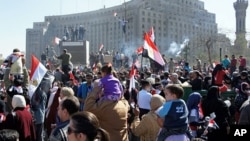A leading Sunni sheikh addressed a crowd in Cairo's Tahrir Square Friday, on a day honoring the martyrs of Egypt's revolution.
Egyptians packed Tahrir Square yet again Friday to listen to popular cleric Yusuf Qaradawi, one week to the day after Egyptian President Hosni Mubarak resigned.
There was certainly joy at what many Egyptians consider to be a political victory, but people quickly reflected on those who died during the protests that began January 25.
Sheikh Qaradawi led Friday prayers, honoring those who died or went missing during the 18 days of protests and praying for the future of the country. He praised the military, which has promised to safeguard a peaceful transition, and called for the prompt release all political detainees.
The popular cleric, who had been banned from public speaking in Egypt for decades, called on all Egyptians to support the revolution by devoting themselves to work - a request apparently aimed at the series of strikes that began when Mr. Mubarak stepped down.
Qaradawi praised Egypt's young people for their role in the revolution, and he called on all Egyptians to demonstrate patience during these transitional times.
Ahmad Shamseldin, a 30-year-old physician in Cairo, was in the crowd listening to the sheikh's message.
"He expressed what we all Egyptians needed to hear today," said Shamseldin. "We are thinking that the army is doing enough, but it is too slow."
Shamseldin wants to see a new Cabinet in place, because he detests the old regime.
"They represent to us the stealing of the money of the Egyptian people, the taxes, the selling of the Egyptian people's industry and putting the money into their bank accounts," he said.
Sherifa Saleh, in her mid 30s, says she thinks things are progressing well in Egypt.
"I think things have been going smooth so far, and people trust the military," said Saleh. "They trust them, and I'm sure it's going to be a smooth process, not just during the coming few days but the coming months."
Saleh says her main purpose for going to Tahrir Square is to honor the martyrs - the people, as she says, "who gave their lives for this revolution to succeed." Even with her eyes shielded behind her dark sunglasses, Saleh's emotion is evident.
"They will never be forgotten. That's all I can say," she said.
Some in Tahrir Square wore laminated tags with the colors of the flag on one side and photos of those who died on the other.
But the gathering also included the celebratory fanfare of a sporting event- Some had their faces painted in red, white and black. Vuvuzelas blared. Flags in all sizes were held aloft. Young women wearing scarves over their hair hawked "I heart Egypt" t-shirts.
A mother named Salwa took in the joyful atmosphere with her her children. Wearing a dark peacoat and a flowing denim skirt down to her toes, a white scarf covering her hair, she smiled as she surveyed the massive crowd.
"Just to celebrate with everyone, because the kids didn't have a chance to come during those hard days, so I wanted them to celebrate and enjoy," said Salwa.
Salwa's young daughter wore a headband across her forehead in the colors of the Egyptian flag and turned her face so that the flag painted on her cheek was plainly visible.
Salwa said her children, who range in age from 5 to 17, were plugged into the revolution.
"Minute by minute, they didn't miss anything, watching TV and on Facebook and whatever newspapers on the internet," she said. "They were sharing everything, like, minute by minute."
Amid the celebration, Salwa says she is sorry that those who died are unable to celebrate the one-week anniversary of Mr. Mubarak's resignation.
"But we are so proud of them, and we know they are watching us from above and they are celebrating there, with each other, so that is enough for me," said Salwa.
There were a few solemn marches on the outskirts of the crowd, each consisting of a dozen or so people carrying posters of men who died.
While the emotions displayed in the square ranged from jubilation to sorrow, Shamseldin, the physician, says the common theme is unity.
"The Egyptian people have been united in this square like they have never been united before," he said. "The Egyptian people here in this state, in this place, in this square... We have seen different types and different religions and different ages and different ideologies who are united right here in this square. Nobody thinks that he has something to do over the others. No one thinks he is better than the others. It is just all the people united expressing their opinions."
A review committee has been appointed to redraft constitutional articles in a bid to pave the way for transparent elections.




